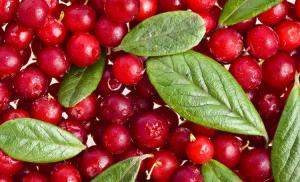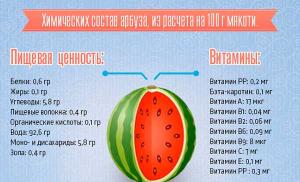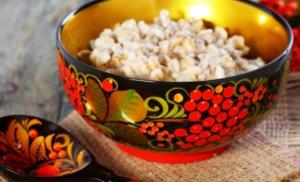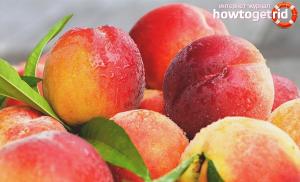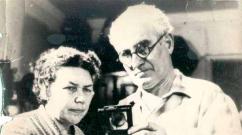What to add to water to quench thirst. Thirst quenching drinks
Health
Summer, heat, thirst. The human body loses fluid and dehydration begins. The loss is only 5% water in the body reduces brain function, deprives us of strength and energy.
How to quench thirst so as not to harm the body, and so that after 10 minutes the thirst does not become stronger? 7 rules will help you properly maintain water balance and prevent dehydration.
How to quench your thirst correctly
1. Drink enough

At the same time, do not forget that a healthy body should receive about 50% of the required fluid from various dishes, for example, soups, vegetables, fruits.
2. Drink little and often

A one-time intake of liquid in a large volume is an additional burden on the cardiovascular system and kidneys. After drinking this, profuse sweating immediately begins.
Drink water in small sips, ideally constantly throughout the day. If thirst has already overtaken you, take a few sips at intervals of 5-10 minutes. within half an hour. The feeling of thirst will pass much faster.
3. Drink non-cold drinks

Oddly enough, cold water quenches thirst worse and longer than water at room temperature. First, it masks the symptoms of thirst by cooling the salivary glands. Secondly, cold water causes a feeling of heaviness as it takes a long time to be absorbed.
Cold (and especially ice-cold) drinks slow down digestion and can cause sore throat, one of the most common diseases in the summer.
How to quench your thirst in the heat
4. Drink before you're thirsty

Thirst is the first sign of the body's dehydration, and it is better not to let it get to that point. When planning to go out into the sun or engage in physical activity, drink 200-300 ml of liquid, this will prevent dehydration.
People who are overweight and those who suffer from diabetes and kidney disease should be especially careful about quenching their thirst in a timely manner.
5. Drink before meals

After you have quenched your thirst, you should wait 15-20 minutes and only then start eating. In this case, drinking will remove weakened digestive juices from the stomach and revive internal secretion.
Moreover, research shows that if you want to lose weight, drinking a glass of water before meals satisfies the first, most acute pangs of hunger and reduces the amount you eat.
It's no secret that the human body is almost three-quarters water. Therefore, in case of its deficiency, metabolic processes slow down significantly, cells begin to experience a deficiency of microelements, and the person himself suffers from lethargy, apathy and lack of tone.
The question of how to quench thirst worries not only lovers of intense physical activity and bathhouse fans, but also the vast majority of people throughout the year. There are many ways to replenish the lack of fluid in the body, but not all drinks cope well with this task.
How does the feeling of thirst arise and why is it dangerous?
To answer the question of how to properly quench thirst, it is worth analyzing the mechanism of its occurrence. The record holders for fluid content in the human body are muscle tissue, as well as the circulatory and lymphatic systems. In addition to water, they also contain microelements such as sodium, potassium and magnesium salts, which are necessary for complete metabolic processes in the body. When the ratio of water and salt changes, the blood vessels have to suck fluid from the surrounding muscle tissue.
At the same time, muscle fibers, experiencing a lack of fluid, transmit certain impulses to the brain. It is this that causes the larynx and throat to contract intensely after receiving the appropriate signal, which provokes decreased saliva production. As a result, the person becomes difficult to swallow, and he is clearly aware of his desire to replenish his water reserves. If you do not quench your thirst in a timely manner, you may experience the following unpleasant consequences:
- The production of elastin and collagen is disrupted, which significantly accelerates the aging process of the skin, making it more wrinkled and outwardly similar to dry parchment.
- If there is a lack of fluid, muscle tissue begins to dry out and slowly degrade.
- Blood viscosity changes, which can cause blood clots to clog blood vessels. The consequences of such disorders are usually strokes and heart attacks.
The daily amount of water consumed can vary from 1.5 to 3 liters, depending on the physiological and other characteristics of a particular person. Fluid leaves the body quite quickly both with urine and through the gastrointestinal tract, as well as with breathing and sweating. Therefore, in the hot season, you need to drink much more water than in the cold season.
How can you quench your thirst in summer? The best way to say goodbye to thirst in the summer heat is to drink a couple of glasses of suitable liquid, pausing between doses for 10–15 minutes. A few minutes after the first portion has been drunk, you need to make sure that the feeling of dry mouth has passed without a trace. If thirst still makes itself felt, you should slowly drink another glass after the specified time period. Thanks to this method, you can most effectively eliminate the feeling of lack of fluid, but which drink quenches thirst best?

Contrary to what many people think, ordinary water is not the best way to quickly relieve thirst. Why? The fact is that during the hot period of the year a person has to sweat very intensely both during the day and at night. This provokes excessive loss of both moisture and a mass of important microelements, such as potassium, magnesium, sodium and phosphorus.
It is for this reason that the body needs to directly replenish water and salt reserves. If a person drinks ordinary water in sufficient quantities, an increased loss of various salts occurs, while the feeling of thirst disappears only for a short period. Therefore, we can say that the more water you drink, the more and more you want it.
How can you quench your thirst in the heat? Is there a way out? Yes! Drink mineral water. The salts dissolved in it will replenish the balance in the body in the required volume. However, read the label carefully. The fact is that excess mineralization is only suitable for treating the gastrointestinal tract, so choose water with a salt content of no more than 10 g per 1 liter.
There is another good way - cool water with lemon. Try adding a slice of lemon to a glass of water: the natural acid will help quickly relieve the feeling of dry mouth.
Warm herbal tea helps quickly quench your thirst. The composition of this drink is extremely rich in essential vitamins and mineral salts, which can slow down the process of liquid absorption through the intestinal walls, making it possible to forget about thirst for a fairly long period of time.
Of course, we are talking exclusively about home-brewed herbal tea, and not about ready-made sweet drinks from the supermarket. Iced tea allows you to create a feeling of coolness, and hot tea stimulates the secretion of sweat, which entails cooling of the body due to the intense loss of excess heat that goes away along with evaporation.

It should be noted that black or green tea will only aggravate the problem. They contain too many tannins, which irritate the gastrointestinal mucosa; in addition, these drinks contribute to the rapid removal of fluid from the body, which provokes dry skin and the appearance of early wrinkles.
Other drinks
When talking about thirst-quenching drinks, we must not forget about natural juices. However, you will help your body get rid of thirst and get a portion of vitamins and microelements only if we are talking about natural freshly squeezed juices that do not contain sugar, sweeteners, preservatives and other harmful ingredients.
How to quench your thirst instead of juice or tea? For such tasks, a compote of dried fruits or fresh apples, pears and seasonal berries, supplemented with a sprig of mint, is quite suitable. It is very good and healthy to drink fruit drinks made from sour fruits or berries.
So, what is the best solution for a task like this? How to quench your thirst without harm to your health? As it turned out, this can be done perfectly if you drink herbal or ginger tea, natural juices, compotes, and fruit drinks. But to relieve dry mouth, the following drinks should be neglected:
- Packaged juices and sweet carbonated drinks are definitely a bad solution, since such drinks can only quench your thirst for a short period of time, but soon this feeling will return and become much more disturbing. And the huge amount of sugar in these drinks contributes to rapid obesity and the development of diabetes.
- Coffee (like black or green tea) is a strong diuretic drink, so it can lead to excess moisture loss.
- Any alcoholic drinks (like beer and kvass) increase the acidic environment in the body, which leads to severe dehydration. In addition, such drinks upset the potassium balance, which often leads to various problems with the cardiovascular system, including cardiac arrest.
Drink only natural healthy drinks. Do not harm your body, and then all day you will feel only health and vigor.
As you know, on a hot day you are always very thirsty. Typically, the human body requires 2-2.5 liters of fluid per day, and during physical activity and in the heat about 4 liters. Loss of moisture must be replenished, but not with just anything, but with drinks that are beneficial for our body. “So how can you get rid of and quench your thirst?” - you ask. Here is a ranking of the healthiest drinks that best quench your thirst.
Kvass. In addition to the fact that natural kvass quenches thirst well, it is also filling, as it contains amino acids and carbon dioxide. Just read the product ingredients carefully. Bottled carbonated kvass, which contains flavorings and preservatives, will bring absolutely no benefit to your body.
Mineral water. Thanks to the salts and biologically active substances contained in mineral water, it ranks second in its ability to quench thirst. In addition, it relieves fatigue and refreshes. To quickly get rid of thirst, add some sour berries or a slice of lemon to mineral water.
Tea. This drink is a leader in its ability to quench thirst (by the way, to get drunk it requires one third less than water). The temperature of the tea does not matter; it can be drunk either cold or hot. Tea also contains vitamin P, which helps strengthen the walls of blood vessels.
Compotes, juices, fruit drinks. Fruit drinks made from fresh berries quench your thirst well. Fruit juice contains a lot of minerals and vitamins; it refreshes and improves the digestion process. It’s just better to cook it not concentrated. As for juices, it is better to drink them freshly squeezed and diluted with water. They are healthier than store-bought ones and are also absorbed faster. Compotes quench thirst worse, as they contain a lot of sugar. The exception is compotes cooked with a minimum amount of sugar or without it at all. It is better to drink compote cold and diluted small.
Fermented milk drinks. All fermented milk products (ryazhenka, kefir, yogurt) perfectly quench thirst. And unlike milk, they are absorbed faster. In addition, all types of fermented milk products can be consumed together with vegetables, fruits and berries. However, in extreme heat it is better to avoid using them. Since both milk and fermented milk products are perishable and can cause various intestinal disorders.
Here is a list of the least healthy drinks to quench your thirst on hot days.
Coffee puts stress on the blood vessels and heart. And an excess of this drink can even cause dehydration.
Various sweet sodas. It is enough to read the composition of this cocktail of dyes, flavors, preservatives and sweeteners to understand that this drink will not bring any benefit to the body, especially in the heat.
Beer will also provide your heart and blood vessels with additional stress. Therefore, it is also better to abstain from it or, as a last resort, drink no more than a glass a day.
About strong alcohol, as you understand, it is unnecessary to mention. Everyone already understands that it puts a tremendous strain on the blood vessels and heart, especially in hot weather, and can pose a serious threat to the health of even a very strong person.
With the onset of hot days, quenching thirst becomes one of the most pressing issues. Knowing the right ways to deal with this seasonal scourge will help save you from unnecessary health problems.
What is thirst
The mechanism of thirst can be compared to a car overheating - it appears when the body’s supply of fluid decreases.
The amount of fluid in the body decreases due to increased sweating, sunburn or diet. Even being on a plane for an hour can cause you to lose more than half a liter of water. This occurs due to the evaporation of moisture from the surface of the skin and during breathing. As the amount of fluid decreases, the body begins to draw moisture from saliva. Therefore, the oral mucosa becomes dry and rough. If you do not replenish fluid reserves, you will feel tired, weak and have a headache. As dehydration worsens, dizziness and other more severe symptoms may occur.
How to quench your thirst
According to experts, soft drinks are best suited for this. After all, they have special components that are able to retain moisture in the body. As a rule, these are sugars, organic acids and minerals. Drinks rich in organic acids and potassium salts are especially helpful.
At the same time, the most important thing to understand is that you should not quench your thirst with cold drinks. This is the easiest and most unhindered path to sore throat and colds. In addition, according to experts, warm drinks or drinks at room temperature cope much better with thirst. Therefore, the habit of quenching thirst with ice-cold liquids is not only harmful, but simply ineffective.
Nectars
Don't think that nectar is just a cheap juice option. Its difference is not at all that it is diluted with water. It’s just that good nectar is made from those fruits that do not allow the manufacturer to squeeze out all the juice (peach, apricot, pear, etc.). Fruit puree is produced from them, which is then diluted according to a special recipe. And nectars are made from fruits and berries, the juice of which is not particularly enjoyable to drink in its pure form. These are, for example, cherries, pomegranates, black currants and others.
Fruit juices are the healthiest thirst quenchers. The only thing you need to remember is quality. Juices with pulp are healthier than clarified ones. As for concentrates, no matter how terrible this word may sound, this is not the worst option.
Concentrates of various juices are often mixed to obtain multi-component drinks, for example, apple-carrot, apple-grape, apricot-peach, multivitamin, etc. If the manufacturer complies with all the requirements when making concentrates, then such juice not only tastes good, but also costs far from cheap.
This drink is berry juice diluted with water and slightly sweetened. Ideal bases include lingonberries, cranberries, red currants, blackberries, bird cherry, raspberries...
Modern industrially produced fruit drinks are prepared on the basis of unfermented berry juices or aqueous extracts. But in the old days, when preparing fruit juice at home, berry pulp was used, which was boiled, filtered and mixed with sugar and already fermented juice. The result was a drink that contained some alcohol.

Kvass
This is one of the most popular and delicious ways to relieve thirst. It is easy to prepare at home. And if you prefer store-bought, look for one that contains water, sugar, kvass wort and yeast. Everything else is far from the classic version and refers to kvass drinks.
For the hot season, the green option is especially useful. By the way, it is best to drink it not too hot, but not too cold. So, it is able to lower body temperature by almost 1 degree. A slice of lemon would be a great addition. A cup of aromatic tea will quickly revive your body and make you forget about thirst, at least for a while. 
And a full two-thirds are drinks. We rated their ability to quench thirst on a 5-point scale.
According to scientists, this is the best thirst quencher - it requires a third (!) less than water. It doesn't matter whether it's cold, hot or lukewarm. Green tea is favored by its high content of vitamin P, which has a positive effect on blood vessels. This magical elixir is easier to drink and does not leave yellow stains on the teeth, and black tea, due to the caffeine, is a better tonic. One glass of both contains 12-15 mg of flavonoids, which are an excellent means of preventing cancer and cardiovascular diseases. However, green contains simple flavonoids, while black contains complex flavonoids. It is not difficult to guess that the former are absorbed faster.
Secret. Hot green tea can protect the skin from ultraviolet rays: 4 cups of drink a day - and the result is obvious!
Water (****)
The most common and inexpensive drink. Due to the large amount of salts and biologically active substances, cool mineral water ranks second after tea in its ability to quench thirst. It perfectly refreshes, stimulates appetite and even relieves fatigue. Table waters with a mineralization level of no more than 1 g/l are perfect, as well as medicinal table waters with a mineralization of 4~5 g/l, such as Borjomi. More than 10 g/l is already a medicine that should be used only as prescribed by a doctor.
If you do not have gastritis or stomach ulcers, give preference to sparkling water. Carbon dioxide, entering the mouth, causes strong salivation and quickly overcomes thirst.
Secret. Adding a slice of lemon or a few sour berries to the water - cranberries or lingonberries - will help overcome the “enemy”.
In order for moisture to be retained in the body, tea, juice or soda must contain dissolved nutrients, mainly sugars, organic acids and minerals. After all, the point of quenching thirst is not to take in as much cool liquid as possible, but to restore strength and replenish nutrients that have “floated” from the body.
Juices and nectars (***)
In summer, tomato, cherry, grapefruit, plum, cherry plum and dogwood juices help well. The acid irritates the taste buds, profuse salivation begins - and it seems to us that it is not so hot around. Juices with pulp, as well as blended (mixed) juices, quench thirst much worse. However, they also contain fiber, pectin, and fat-soluble vitamins, so their nutritional value is higher.
Secret. In hot weather, diluted juice is best. The fact is that isotonic drinks (close in concentration to blood plasma) are absorbed faster and bring relief.
Dairy products (****)
Kefir, fermented baked milk, yogurt, yogurt, including organic acids, perfectly quench thirst. In addition, they are quickly absorbed (91% in an hour, while milk is only 32%). Some of them - for example, bifidokefir, bifidok - help restore the normal composition of the intestinal microflora. Sour milk of all types can be consumed with sweet fruits, berries, and vegetables.
Secret. During the fermentation process, lactose is converted into lactic acid, so fermented milk products are suitable for people suffering from individual intolerance to milk sugar.
Milk (***)
When the temperature “overboard” has exceeded all possible limits, try drinking a glass of skim milk or whole milk diluted with water. This drink relieves stress, prevents breast cancer and osteoporosis (a disease that leads to brittle bones), lowers blood pressure and fights excess weight.
Secret. Tea with milk is a tonic drink that has a beneficial effect on the gastric mucosa.
The secretary of the Patriarch of Antioch Macarius, who traveled to Muscovy in the 18th century, wrote that “in Russia people drink kvass instead of water, and therefore never suffer from diseases that come from bad water.” In the 19th century, it turned out that this drink actually has bactericidal properties - cholera vibrios and typhoid bacilli die in it within 20 minutes. Real, classic kvass, thanks to the carbon dioxide and amino acids it contains, is an excellent thirst quencher. It's filling. In addition, kvass belongs to the group of so-called fermented drinks, and therefore promotes faster digestion of food.
Secret. With regular consumption, kvass improves the functioning of the nervous system.
Not recommended. Drink carbonated kvass sold in bottles. Additions of food coloring, sweeteners, citric, sorbic and benzoic acids turn it into ordinary lemonade, only vaguely reminiscent of the taste of the original product.
Unfortunately, the “hop nectar” beloved by many contains alcohol, and therefore more than a couple of bottles a day is already too much. The point is not even beer alcoholism, but the fact that alcoholic drinks cannot fully replenish water loss. In addition, beer is high in calories, which means it is not suitable for those watching their figure.
Secret. Czech and German doctors claim: in small quantities (no more than one mug per day), beer reduces the risk of cardiovascular diseases, has a positive effect on the kidneys, preventing the formation of stones, and increases the body's defenses.
Compote (**)
To be precise, compote is not a drink, but a sweet dessert dish, since the most valuable thing in it is not the liquid, but the berries or fruits. The thirst-quenching ability of compote is quite low - due to the fact that it contains more sugar than organic acids and mineral salts.
Secret. If on a hot day you decide to drink cold compote, dilute it with a small amount of water and add red wine (at the rate of 1 glass of wine per 3 liters of compote syrup) - and your thirst will subside.
Lemonade (*)
The prototype of all modern carbonated drinks was lemonade, which was prepared by mixing a small amount of sugar, alcoholic tincture of zest and citrus juice with water. Now manufacturers are abandoning fruit syrups and infusions of aromatic herbs, replacing them with cheaper concentrates. Therefore, the main components of “soft drinks” are food colorings and preservatives (most often sodium benzoate, which is suspected of causing allergies). They hardly quench thirst and are consumed in larger quantities than tasteless liquids. Pleasant sensations play a bad joke on us, because with every sip we get a lot of “foreign” substances - flavorings, food additives... All this “chemistry” leaves a cloying aftertaste, and the so-called residual sweetness has to be washed down again and again.
Secret. Truly healthy lemonade can be made at home. To do this, you just need to dilute the fruit puree with mineral water.
